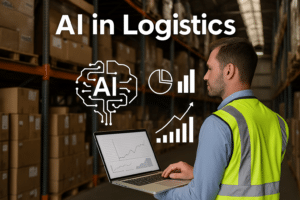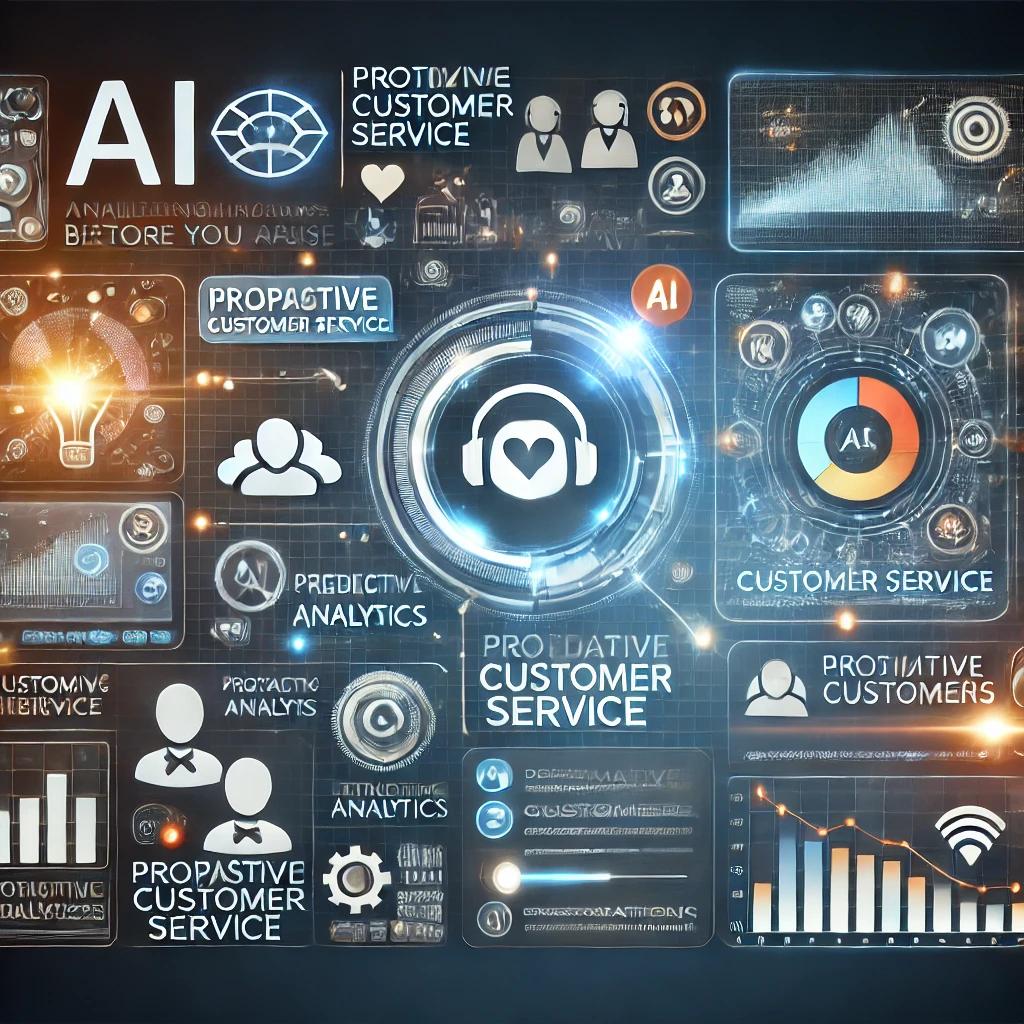The logistics sector is experiencing a deep change promoted by the presence of artificial intelligence (AI). As companies move to improve the efficiency and consistency of supply chains, AI-based technologies are emerging as essential enablers of logistics companies, allowing them to streamline their business. This piece delves into the complex impact of AI in logistics, benefits, real applications, and prospective trends that enterprises must take into account for lasting growth and competitiveness.
What is the Role of AI in Logistics?
How is Artificial Intelligence Transforming Logistics?
Artificial intelligence is revolutionizing logistics by bringing in sophisticated algorithms that can process enormous amounts of data to enhance efficiency and decision-making. AI technology allows logistics firms to automate manual tasks, predict demand, and route-optimize, lowering operation costs and improving service levels. With the help of AI capabilities, organizations are able to have real-time insights into their supply chain activities, making them respond quickly to altering market conditions and customer needs.

What Are the Key Use Cases of AI in Logistics?
AI logistics has many use cases that help improve overall operation efficiency. For example, predictive analytics can be done using AI algorithms, enabling logistics managers to predict inventory needs and streamline stock levels accurately. Additionally, AI can help warehouse operations be automated by simplifying order picking and packing procedures, minimizing human mistakes, and improving throughput. Moreover, AI technology allows for better route optimization so that delivery trucks travel the shortest distances possible, thereby reducing costs and enhancing customer satisfaction.
How Can Logistics Companies Integrate AI Systems?
Implementing AI systems in current logistics processes necessitates a strategic move. Logistics companies need to initially determine the methods for which they can use automation and optimization. In continuation, these firms should invest in corresponding AI tools and platforms that cater to their working requirements. Preparing staff to collaborate with AI systems is yet another imperative to ensure smooth integration. Through cultivating a culture of innovation and responsiveness, logistics companies can easily incorporate AI and reap its maximum benefits to improve supply chain management.
What Are the Benefits of AI in Logistics?
How Does AI Improve Efficiency in Supply Chain Management?
AI significantly improves efficiency in supply chain management by automating repetitive tasks and providing actionable insights through data analytics. For example, AI can be used to analyze historical data and generate forecasts that help logistics managers make informed decisions about inventory levels and order fulfillment strategies. This not only optimizes resource allocation but also ensures that businesses can meet customer demands without overstocking or stockouts. Ultimately, the benefits of AI lead to reduced operational costs and enhanced service delivery.
What Are the Potential Benefits of AI for Inventory Management?
AI’s impact on inventory management is profound. By employing machine learning algorithms, businesses can achieve greater accuracy in demand forecasting, which is crucial for maintaining optimal inventory levels. AI can also automate inventory replenishment processes, ensuring that stock is maintained at appropriate levels without manual intervention. This capability allows logistics companies to reduce holding costs and improve cash flow while ensuring that they can meet customer demands promptly. The automation of inventory management reduces the potential issues associated with human error and enhances overall operational efficiency.
How Can AI Streamline Warehouse Operations?
AI can streamline warehouse operations in several ways, from automating picking processes to optimizing storage layouts. AI-powered robotics can be deployed to assist in sorting and transporting goods, which significantly reduces the time taken to fulfill orders. Additionally, AI systems can analyze real-time data, allowing for dynamic adjustments to workforce allocation based on fluctuating demand. This level of operational agility not only improves productivity but also enhances the accuracy of order fulfillment, leading to increased customer satisfaction and loyalty.
How Can AI Optimize Supply Chain Processes?
What Are the Best Practices for Using AI to Automate Logistics?
To effectively use AI to automate logistics, companies should follow best practices that ensure successful implementation and ongoing optimization. Firstly, it is crucial to define clear objectives that align AI initiatives with business goals. Secondly, organizations must invest in robust AI platforms that can handle vast amounts of data and provide real-time analytics. Additionally, fostering collaboration between IT and operational teams can help identify opportunities for automation and facilitate the integration of AI systems. Continuous monitoring and optimization of AI models are also essential to adapt to changing logistics environments and enhance performance further.
How Can Predictive Analytics Enhance Decision-Making in Logistics?
Predictive analytics plays a pivotal role in enhancing decision-making within the logistics industry. By leveraging AI-driven analytics, logistics managers can gain insights from historical data and real-time information to anticipate future trends and challenges. This foresight enables companies to make proactive decisions regarding inventory management, fleet optimization, and customer service. With AI tools, logistics companies can simulate various scenarios, allowing them to identify the best strategies for maximizing efficiency and mitigating risks across their supply chain.
What Role Does Machine Learning Play in Optimizing Supply Chains?
Machine learning, a subset of AI, is instrumental in optimizing supply chains by enabling systems to learn from historical data and improve over time. By utilizing machine learning algorithms, logistics companies can identify patterns and correlations within their data that may not be apparent through traditional analysis methods. This capability allows for more accurate forecasting, dynamic routing, and effective inventory management. Furthermore, machine learning can adapt to new data inputs, providing logistics managers with ongoing insights that enhance operational efficiency and decision-making.
How to Implement AI in Logistics Companies?
What Steps Should Logistics Companies Take to Adopt AI?
To adopt AI successfully, logistics companies should follow a structured approach. The initial step involves conducting a thorough assessment of existing processes to identify areas where AI can provide the most value. Next, companies should develop a clear roadmap that outlines the technology requirements, budget considerations, and timelines for implementation. Engaging stakeholders and providing training for employees is crucial to ensure buy-in and facilitate smooth transitions. Finally, companies should continuously evaluate the performance of AI systems and make adjustments based on feedback and evolving business needs.
How to Choose the Right AI Platform for Logistics?
Selecting the right AI platform is critical for logistics companies looking to harness the power of AI. Organizations should consider factors such as the platform’s scalability, compatibility with existing systems, and the range of AI tools and capabilities it offers. It is essential to evaluate the vendor’s track record and expertise in the logistics industry. Additionally, seeking platforms that provide robust support and training resources can significantly enhance the likelihood of a successful implementation, ensuring that logistics firms can effectively leverage AI for improved operational efficiency.
What Challenges Might Companies Face When Integrating AI?
Integrating AI into logistics operations can present several challenges. One of the primary issues is the resistance to change from employees who may be apprehensive about new technologies. Overcoming this barrier requires effective change management strategies and ongoing communication about the benefits of AI. Additionally, data quality and availability can hinder the successful implementation of AI systems. Logistics companies must ensure that they have access to accurate and comprehensive data points to train AI models effectively. Addressing these challenges is crucial for unlocking the full potential of AI in logistics.
What Future Trends in AI-Powered Logistics Should Be Considered?
How Will Generative AI Influence Logistics and Supply Chain?
Generative AI is poised to influence logistics and supply chain management significantly. By creating new data and scenarios based on existing information, generative AI can help logistics companies simulate various outcomes and optimize their strategies accordingly. This technology can enable better risk assessment and contingency planning, ensuring that businesses are prepared to navigate disruptions in their supply chain. The ability to generate predictive models can also lead to more informed decision-making, ultimately enhancing operational efficiency and reliability.
What Innovations Are on the Horizon for AI in Logistics?
As AI continues to evolve, several innovations are on the horizon for the logistics industry. These include advancements in autonomous vehicles and drones for deliveries, which can significantly reduce transportation costs and enhance delivery speed. Additionally, AI-powered chatbots and virtual assistants are expected to improve customer interactions and streamline communication processes. Innovations in blockchain technology integrated with AI can also enhance transparency and security across the supply chain, fostering trust among stakeholders and improving overall operational efficiency.
How Can Companies Leverage Historical Data with AI?
Companies can leverage historical data with AI by using advanced analytics to uncover insights that drive operational improvements. By training AI models on historical data points, logistics firms can identify trends and patterns that inform strategic decision-making. For instance, analyzing past shipment data can help logistics companies predict future demand fluctuations, allowing them to adjust inventory levels proactively. Furthermore, AI can help optimize supply chain processes by providing recommendations based on historical performance metrics, enabling continuous improvement and efficiency gains.
Conclusion
AI integration in logistics is now a reality and not something that will exist in the future; it is a mandate for companies to stay competitive. From predictive analytics to automation and real-time optimization, AI-driven logistics is transforming supply chain management. Logistics businesses can enhance efficiency, save costs, and deliver greater customer satisfaction by harnessing AI technologies. As AI keeps changing, those organizations that adopt and align will be ready for long-term growth and leadership in the industry.



